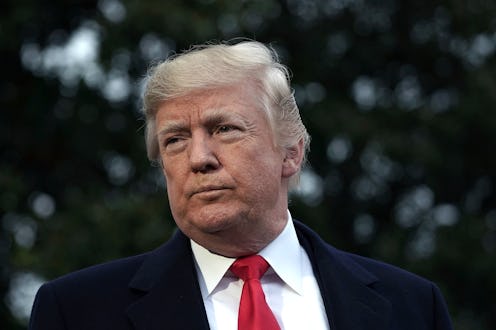News
Trump Is Banning The CDC From Using Words Like "Fetus" & "Transgender" In Documents

Since President Trump took office, his administration has gradually introduced policy changes that affect the way federal agencies address reproductive and LGBTQ rights. Its next target is the United States’ lead health protection agency, the Centers for Disease Control and Prevention (CDC). On Friday, the Trump administration reportedly told CDC analysts words like “transgender” and “fetus" are banned from any official documents related to the agency’s forthcoming budget.
According to The Washington Post, CDC analysts were informed of the banned terms at a meeting with agency officials who oversee the budget. In addition to “transgender” and “fetus,” other words that analysts were instructed to avoid when preparing the 2019 budget include “vulnerable,” “entitlement,” “diversity,” “evidence-based,” and “science-based.”
The decision is already raising eyebrows among members of the scientific community, who believe Trump-appointed officials are rejecting basic scientific principles in favor of conservative bias.
In an open letter to CDC acting science director William MacKenzie, Aaron Huertas, the founder of Science Communication Media, a strategic consulting group that works with policy researchers, argued that the decision violates the CDC’s scientific integrity policy. Huertas wrote that “scientific censorship is not only wrong because it hides the truth from the public, but it’s wrong because it perpetuates injustice.” One CDC analyst told The Washington Post that the reaction of their colleagues upon being informed of the forbidden words was "incredulous," adding that they couldn't remember a time when the agency took an ideological stance on such issues.
While the CDC employs longtime researchers and analysts, it is run by a presidential appointee, and falls under the purview of the Department of Health and Human Services, another federal agency. The current acting director of the CDC is former Georgia public health commissioner Brenda Fitzgerald, who was appointed by Trump in July.
As a federal agency, the CDC has always been vulnerable to some degree of political influence. Back in 2007, Jeff Levi, then the executive director of Trust For America’s health, told ABC News that he worried that under the George W. Bush administration, he had seen “seen more and more intrusion of politics on some of [the CDC’s] scientific decision making." One example of a politically-influenced decision made that year by the CDC included inviting two pro-abstinence speakers to an STD prevention conference in Florida.
In 1996, gun control research conducted by the CDC was shut down after Republican lawmakers and the National Rifle Association voiced concern that the public health agency was promoting a gun control agenda. The repercussions of this decision have been felt to this day, as The Washington Post noted following this year’s Las Vegas massacre.
So while it’s no surprise that the Trump administration would play politics by banning words like “transgender” and “fetus” from the CDC’s budget documents, this move seems to be a particular affront to basic principles of truth and science. In a tweet, New York Times book critic Michiko Kakutani called the move “Orwellian,” drawing parallels to George Orwell’s dystopian novel 1984, in which citizens living under a totalitarian state are restricted from using vocabulary that threatens the party in power.
The parallels with 1984 were not lost on the likes of James Martin, a Jesuit priest and editor-at-large at America Magazine, or media professor Dan Gillmor, who also tweeted about the CDC’s move.
Since Trump took office, his administration’s relationship with science has been shaky at best — on the very same day he moved into the Oval Office, his administration deleted all references to “climate change” on the official White House website. But beyond denying basic scientific findings, the Trump administration has also targeted vulnerable groups with decisions like the transgender military ban (which has since been upheld by the Pentagon) and efforts to block undocumented immigrants from receiving abortions.
Now that the CDC is barred from using these words — “vulnerable” included — the health of such populations may be further jeopardized. It’s hard to imagine how the agency will budget for its research on preventing HIV among transgender people or the effects of Zika on babies if the agency is prohibited from using words that pertain directly to this work.